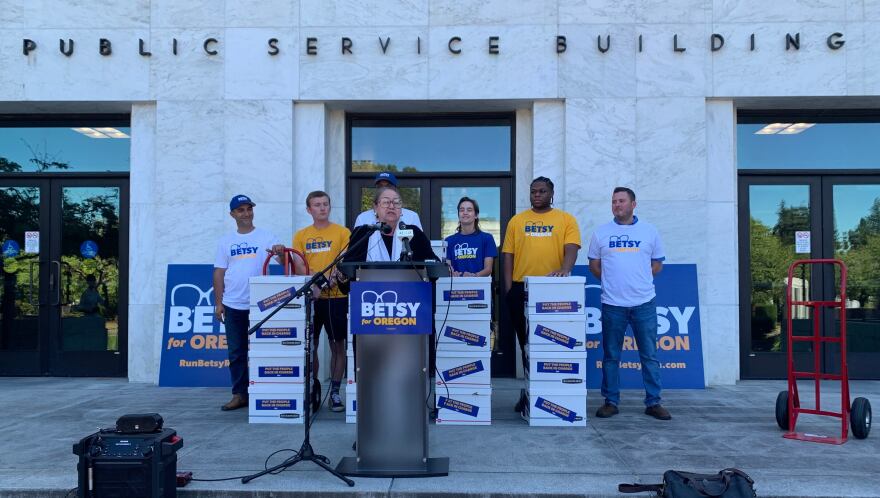Betsy Johnson has loomed large all year in the race to be Oregon’s next governor. Now, she’s officially a candidate.
State elections officials announced Thursday that Johnson had submitted far more than the 23,744 signatures needed to appear on the November ballot as an unaffiliated candidate. She’ll face Democrat Tina Kotek and Republican Christine Drazan, in a three-way race that has attracted national attention both for its political dynamics and the fact it features three female candidates.
“This is a momentous day for Oregon,” Johnson, a former Democratic state senator, said in a statement. “We have an incredible opportunity this year to reject the extremes and elect an independent governor who will put Oregonians first.”
Johnson’s success in qualifying for the ballot has been expected from the moment she announced her gubernatorial bid last year. While most unaffiliated and third-party candidates make few waves, Johnson’s decades in state politics, her deep connections with political players and her aggressive campaigning and fundraising have made her impossible to ignore.
Johnson has handily outraised Kotek and Drazan so far, with help from well-known donors such as Nike co-founder Phil Knight and Columbia Sportswear CEO Tim Boyle. She’s also attracted endorsements from former Republican and Democratic elected officials, as well as many of the state’s major law enforcement organizations. Johnson announced their support Thursday.
“Oregon desperately needs a governor who will make safety, fighting crime and supporting the rights of crime victims a top priority,” Chris Bangs, president of the Oregon State Lodge Fraternal Order of Police, said in a statement released by Johnson’s campaign. “That candidate is Betsy Johnson.”
Johnson began collecting signatures in June, using a mix of campaign events around the state and paid signature gatherers. According to her most-recent campaign disclosures, the candidate spent more than $344,000 on the effort. She has reported raising more than $10.5 million in the race to date.
The money bought Johnson’s campaign peace of mind. When Johnson showed up in Salem to turn in signatures last week, she announced she had collected more than twice as many as the state requires to secure a spot on the ballot. Nearly 80% of those signatures, 37,679, were deemed valid, state elections officials said Thursday.
Johnson’s nonpartisan, politically centrist campaign is aimed at both Republicans tired of losing gubernatorial races and disaffected Democrats upset by issues like crime and homelessness.
“I have said that I am running to put the people of Oregon back in charge,” Johnson said in her statement Thursday, repeating a line she uses often while campaigning. “I’m not running for governor as a D or as an R, I’m running as an Oregonian.”
Whether that message is potent enough to override the inherent disadvantages of running without party backing is one of the race’s major questions. The other: Whether Johnson’s candidacy, if unsuccessful, will siphon more votes from Kotek, a former Oregon House speaker, or Drazan, a former Republican leader in the state House.
Copyright 2022 Oregon Public Broadcasting. To see more, visit Oregon Public Broadcasting.



